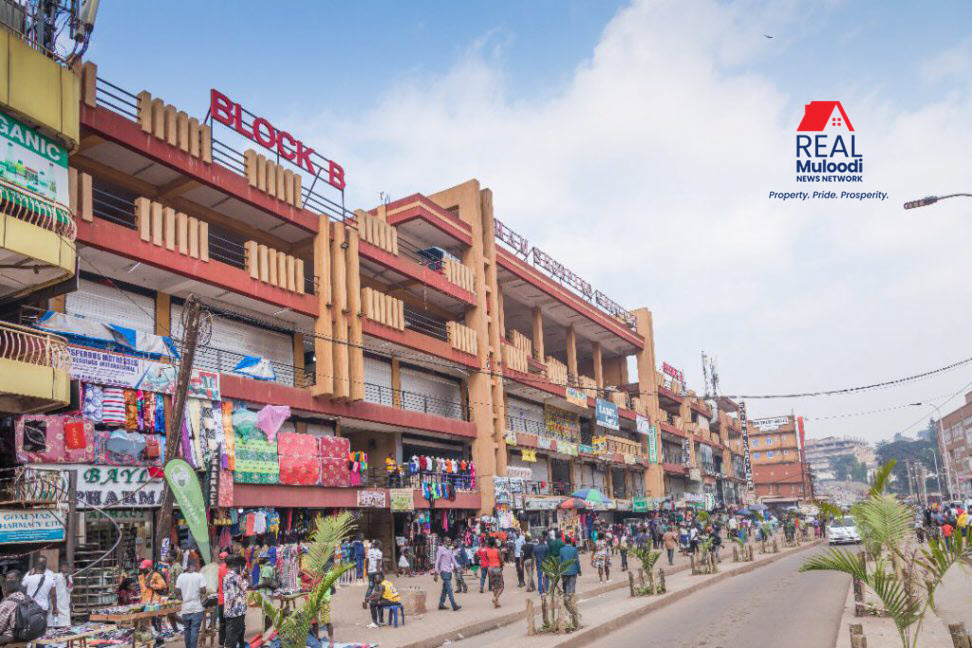UGANDA, Kampala | Real Muloodi News | Several Kampala city traders are vacating their city arcades, and moving to Kampala suburbs. In the wake of Covid-19, city traders are settling for low-cost working spaces in the city suburbs to salvage their businesses.
With the lifting of the first lockdown last year, traders were hopeful of reorganising themselves. Only to have their hopes and dreams shattered in June of this year when President Museveni announced a second lockdown, which compounded the damaging impact.
According to the chairperson of the Kampala Arcades Advocacy Forum (KAAFO), Mr Hussein Kato, at least 32 members of the traders’ association who used to work from the arcades, left between May and June and took their businesses to the Kampala suburbs.
He further said many unregistered traders left the city arcades because of the challenging economic times caused by the Covid-19 pandemic.
Mr Kato believes that cumulative rental arrears will compel many traders to leave their city arcades.
After lifting the first lockdown, the government asked landlords to reschedule payment for rent arrears. However, many landlords defied the directive, which left city traders cash-strapped.
Mr Peterson Lumansi, a former tenant at Temoseo Mpoza Plaza, shifted to Kasubi because of the high rental arrears.
“After the first lockdown, my landlord demanded USh 6 million for the three months we were in lockdown, and I struggled to pay this money because I wasn’t working. These arrears drained me so much. I salvaged the business by shifting it to Kasubi, where I now pay USh 700,000 in monthly rent,” Peterson said.
Although Kasubi is not as busy as downtown, Mr Peterson still makes small profits to sustain his business.
“Once you put your business in a strategic place in the suburbs, I can assure you of good returns, just like someone in the city centre, because there are very many people now staying and working around these areas.” Peterson said.
According to Peterson, he now spends only USh 100,000 monthly on power, unlike his former workplace, where he previously paid USh 250, 000 for power per month.
Mr Peterson advises fellow traders to find working spaces outside the city centre instead of choking on debts.
In January, Ms Charlotte Musiime moved from Wilson Road to Ntinda-Kiwatule Road.
Musiime says her groom’s suits business did not pick up well even after they lifted the first lockdown, as many people suspended weddings because of the lockdown.
“It was a very tough moment and the only option I had was to look for a low-cost shop to keep my business afloat. I used to pay rental fees of USh 1 million per month, but when I moved to Ntinda, I met another colleague, and we got a shop at USh 800,000. This means each one of us contributes USh 400,000 every month,” Musiime said.
Alleged Cheating by Landlords
Apart from the pandemic, traders also complained about alleged cheating by landlords. For instance, they claim some landlords don’t give them tenancy agreements, a void that gives the landlords powers to manipulate them.
These landlords can then evict tenants when they get another tenant willing to pay higher rent. They also increase rental fees anytime.
Some city landlords give tenants rental receipts of less than what they paid, to evade taxes.
Landlords Speak out
Some landlords acknowledged the tenants’ crisis but noted that they, too, have been affected by the pandemic. They owe banks and taxes to the government.
Mr Mansoor Matovu, a landlord, said that the landlords will meet under the Bagaga Kwagalana Association and decide on the rescheduling of rental arrears.
KCCA deputy executive director David Luyimbazi, in an interview, said that Kampala ministers have engaged the city landlords and asked them to give relief to their tenants. According to David, some landlords have complied.
An example of a compliant real muloodi landlord is Mr Hamis Kiggundu, the proprietor of Ham Enterprises, who gave a three-month waiver to all his arcade tenants.
Rental fees in arcades depend on the location of the building and the floor. A 9 x 9 square metres shop rent ranges between USh 2.5 million and USh 4 million a month. Landlords usually ask for four months’ payment in advance before a tenant can start using the space.
When asked whether KCCA is considering traders’ request to waive trading license fees, Mr David said it might not be possible since traders pay their trading licenses annually.
“Trade licenses are paid annually, and it is quite hard to waive it unlike a monthly tax. However, we will continue engaging government as far as the stimulus package for such categories of people is concerned,” he said.
Depending on the type of business, city traders pay a certain amount of money to the Kampala Capital City Authority (KCCA), they pay Value Added Tax (VAT) to Uganda Revenue Authority, and certification fees to Uganda National Bureau of Standards, among others.
Traders argue it is hard to meet all these costs, including power, water and garbage fees, during this pandemic since they have not been working. Although, taxes like VAT apply to goods sold, so if they are not working, they are not taxed.
The banks’ high interest rates worsen the high operational costs the traders face. To salvage their collapsing businesses, traders are resorting to move their businesses to the city suburbs, where the costs are fair.
READ MORE LIKE THIS:
Generous Real Muloodi Hamis Kiggundu Waives his Tenants’ July Rent Arrears



